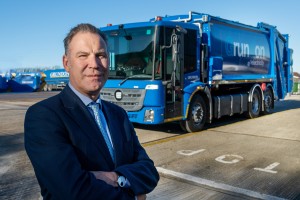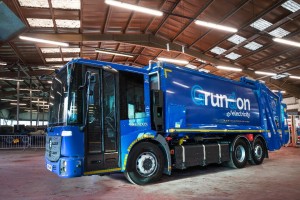Waste management firm Grundon has begun the eco-friendly conversion of its Bristol fleet with the launch of a £300,000 electric collection lorry.
The vehicle will hit the city’s streets this week after completing a period of testing to assess the battery power needed for its range and daily mechanical operations.
Grundon, which set up a new depot in Bristol two years ago, now plans to convert more of its city-based fleet over the coming months.
This will involve another 15 vehicles, including waste lorries and skip vehicles, which will run on electric, hydrogen or technologies that are a hybrid of the two.
The Bristol depot is leading Grundon’s fleet decarbonisation programme, which is part of an ongoing annual £5m investment in vehicle conversions and purchases.
The first lorry to be converted is a Dennis Eagle Mercedes-Benz Econic waste collection vehicle, which has been switched from diesel power to electric in partnership with Dursley-based Refuse Vehicle Solutions (RVS) and Dutch conversion specialists EMOSS.
It will not only contribute to improved air quality in the city but also help Grundon’s business customers cut the carbon footprint linked to their waste disposal.
Grundon chairman Neil Grundon, pictured with the first electric vehicle, said the firm chose Bristol to launch its first electric collection vehicle as the city is at the forefront of wanting to operate more sustainably.
“We want to play our part in helping the city and its business community to reach those goals,” he added.
“We see this innovation as a real game-changer and an important milestone on our journey towards further helping our customers achieve their sustainability targets.”
The move also means Grundon’s Bristol fleet is fully compliant with the city’s Clean Air Zone (CAZ), which came into force in November last year, as its other vehicles are already Euro 6 standard and so exempt from charges.
The CAZ was set up in the city centre in a bid to further improve air quality, cut carbon emissions and move towards zero emission travel.
RVS managing director Spencer Law said the move to electric made both financial and environmental sense.
“Modifying a diesel refuse vehicle not only saves in excess of £100,000 versus the purchase of a new electric vehicle, but it also gives it a new lease of life – literally recycling on the go,” he added.
“We already had a long-standing relationship with Grundon and when they started looking at the electrification route, we were proud to be chosen as their preferred supplier.
“As two family-owned businesses working together, we have absolute confidence and trust in each others’ abilities, and we are very much looking forward to seeing these new vehicles out on the road.”
With a 280kW battery charged from the National Grid, the electric vehicle will have a range of between 80 and 100km and is expected to collect five tonnes of waste daily.
This will, in turn, generate around 3,100kW of electricity at the Viridor Energy Recovery Facility (ERF) in Avonmouth. The average yearly electricity consumption for the typical British home is 2,900kW.
A second electric waste collection vehicle based at Grundon’s Colnbrook depot near Slough is now serving customers across London and the Thames Valley and a third is shortly due to start collections in Reading and Newbury from Grundon’s base in Beenham, Berkshire.
Grundon director Bradley Smith added: “The success of our trials gave us 100% confidence that the new electric vehicles have the capacity to complete daily waste collections without the need to recharge en route.
“Our plan is to purchase further electric vehicles, as well as investing heavily in alternative fuels and looking at further hybrid options.
“Potentially, this may include hybrid electric and hydrogen vehicles and we are very excited by the new technology that is coming along.
“In particular, battery performance is increasing all the time and the further batteries are capable of travelling, the more opportunity there is to invest in this technology.”
Grundon, which was founded in 1929, has reduced its carbon emissions by 80% since 2000 through a series of measures, including an ongoing energy self-sufficiency programme and investment in state-of-the-art technologies.
The firm works with customers across the South of England to provide a total waste management service for the reduction, reuse, recycling, recovering and disposal of waste.





























